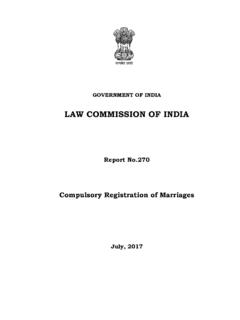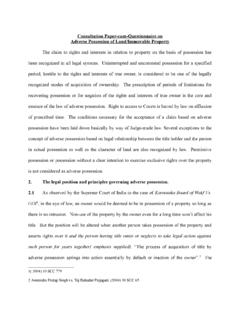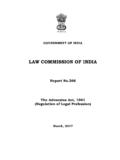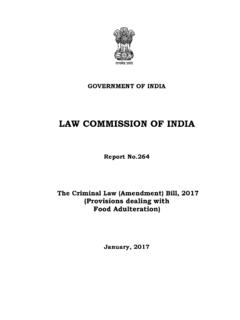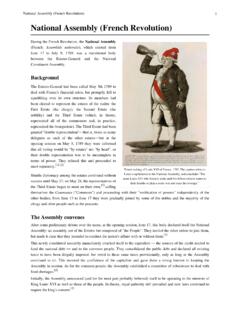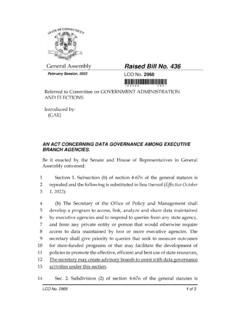Transcription of Hate Speech - Law Commission of India
1 Law Commission of India Report Hate Speech March 2017. ii iii Report Hate Speech Table of Contents Chapter Title Page I Background 1-4. II Hate Speech in India 5-8. III Examination of the Issue by the Commission 9-14. IV Impact of Hate Speech on Freedom of Expression 15-31. V Identifying Criteria of Hate Speech 32-36. VI Review of Penal Law 37-50. Annexure A The Criminal Law (Amendment) Bill, 2017 51-53. iv CHAPTER I. Background Rights are the cornerstone of individual autonomy. They are guaranteed as limits on the power of In democratic societies they have been granted to protect individual from undue State interference. Freedom of expression has been enshrined in article 19 of the Universal Declaration on Human Rights2. It is considered to be one of the most significant rights as it allows a person to attain self fulfilment and strengthen the capacity to fully enjoy Globally, history witnessed a complete subversion of rights and loss of freedoms not just under colonial rule but also the brutal regime of Adolph Hitler who had created a ministry to centralise Nazi control of all aspects of German cultural and intellectual In the Reich Ministry of Public Enlightenment and Propaganda, Hitler appointed Joseph Goebbels as the Reich Propaganda Minister.
2 An unstated goal was to present to other nations the impression that the Nazi Party had the full and enthusiastic backing of the entire It was responsible for controlling the German news media, literature, visual arts, filmmaking, theatre, music and broadcasting. The consequences of such a ministry which aimed at spreading the Nazi ideology,6 are well documented in history. The constituent assembly , conscious of the burdens of history 1. Mill, On Liberty and Utilitarianism 4 (Bantam Classic, New York, 2008) . 2. Res. 217 A (III), 1948. 3. Steffen Schmidt and II Mack C. Shelley, Barbara Bardes et. al., American Government and Politics Today (Cengage Learning, USA, 2014). 4. Peter Longerich, Goebbels: A Biography 212-213 (Random House, New York, 2015). 5. Richard J. Evans , The Third Reich in Power 121 (Penguin, New York, 2005). 6. Roger Manvell and Heinrich Fraenkel, Doctor Goebbels: His Life and Death 121 (Skyhorse, New York, 1960).
3 Placed utmost emphasis on freedom of Speech and expression' as a hard-earned right of the new democracy. The discussion on limitations on this freedom therefore, centred on whether the proviso to the fundamental right to freedom of Speech and expression should cover Speech that is likely to promote class hatred'.7 The discussion was brought up on multiple occasions, not just limited to debates on fundamental freedoms but also on public order' or morality'. It was initially suggested that the freedom of Speech and expression would carry the proviso: (a) the right of every citizen to freedom of Speech and expression: Provision may be made by law to make the publication or utterance of seditious, obscene, blasphemous, slanderous, libellous or defamatory matter actionable or punishable . Provision may be made by law to impose such reasonable restrictions as may be necessary in the public interest including the protection of minority groups and tribes.
4 This provision faced substantial opposition in the assembly where members argued that it denies absolute' nature to rights which are fundamental. After deep consideration and multiple revisions Ambedkar pointed out: it is wrong to say that fundamental rights in America are absolute. The difference between the position under the American Constitution and the Draft Constitution is one of form and not of substance. That the fundamental rights in America are not absolute rights is beyond dispute. In support of every exception to the fundamental rights set out in the Draft Constitution one can refer to at least one judgment of the United States Supreme Court. It would be sufficient to quote one such judgment of the Supreme Court in justification 7. Those who spoke during the discussion in the Committee on hate Speech were Panikkar, Alladi Krishnaswami Iyer, Syama Prasad Mookherjee, Munshi, the chairperson Kriplani, C.
5 Rajagopalachari and Mookherjee and Thakur Das Bhargava. 2. of the limitation on the right of free Speech contained in Article 13 of the Draft Constitution. In Gitlow Vs. New York in which the issue was the constitutionality of a New York "criminal anarchy" law which purported to punish utterances calculated to bring about violent change, the Supreme Court said: "It is a fundamental principle, long established, that the freedom of Speech and of the press, which is secured by the Constitution, does not confer an absolute right to speak or publish, without responsibility, whatever one may choose, or an unrestricted and unbridled license that gives immunity for every possible use of language and prevents the punishment of those who abuse this freedom.". It is therefore wrong to say that the fundamental rights in America are absolute, while those in the Draft Constitution are not.
6 8. The assumption that a rule denying the state power to restrict Speech on the basis of its content will produce the broadest possible debate is problematic as this might produce debate that is informed by the prejudices of the This is especially true in regard to Speech that acts as a tool to marginalise the vulnerable groups by denying them equal place in the society. In a plural democracy, there is always a conflict between different narratives and interpretation of what constitutes public interest. Democracy thrives on disagreements provided they do not cross the boundaries of civil discourse. Critical and dissenting voices are important for a vibrant society. However, care must be taken to prevent public discourse from becoming a tool to promote Speech inimical to public order. The mode of exercise, the context and the extent of abuse of freedom are important in determining the contours of permissible 8.
7 constituent assembly Debates (Nov. 4, 1948) 1459. 9. Owen M. Fiss, "Why the State?" 100 Harv. L. Rev. 785 (1986-1987). 3. The State therefore assumes an important role in ensuring that freedoms are not exercised in an unconstitutional manner. The Constitution acknowledges that liberty cannot be absolute or uncontrolled and makes provisions in clauses (2) to (6) of article 19. authorising the State to restrict the exercise of the freedom guaranteed under that article within the limits specified in those clauses. Thus, clause (2) of article 19, as subsequently amended by the Constitution (First Amendment) Act, 1951 and the Constitution (Sixteenth Amendment) Act, 1963, enabled the legislature to impose reasonable restrictions on the exercise of the right to freedom of Speech and expression in the interests of (i) the security of the State and sovereignty and integrity of India , (ii) friendly relations with foreign States, (iii)public order, (iv) decency or morality, or in relation to contempt of court, defamation or incitement to an offence.
8 Thus it was in this backdrop that the limits' to article 19. contained in 19(2) were arrived at, rather than approaching a definition of hate Speech itself. 10. S. Sivakumar, Press Law and Journalists 11 (Universal Law Publishing Co., Gurgaon, 2015). 4. CHAPTER-II. Legal Provisions of Hate Speech in India Responsible Speech is the essence of the liberty granted under article 21 of the Constitution. One of the greatest challenges before the principle of autonomy and free Speech principle is to ensure that this liberty is not exercised to the detriment of any individual or the disadvantaged section of the society. In a country like India , with diverse castes, creed, religions and languages, this issue poses a greater challenge. Article 19(2) of the Constitution guarantees freedom of Speech and expression to all citizens of India . This article is subjected to certain restrictions, namely, sovereignty and integrity of India , the security of the State, friendly relations with foreign States, public order, decency or morality or in relation to contempt of court, defamation or incitement to an offence.
9 Hate Speech has not been defined in any law in India . However, legal provisions in certain legislations prohibit select forms of Speech as an exception to freedom of Speech . Legislations Around Hate Speech : Presently, in our country the following legislations have bearing on hate Speech , namely:- (i) the Indian Penal Code, 1860 (hereinafter IPC). Section 124A IPC penalises sedition 5. Section 153A IPC penalises promotion of enmity between different groups on grounds of religion, race, place of birth, residence, language, etc., and doing acts prejudicial to maintenance of harmony'. Section 153B IPC penalises imputations, assertions prejudicial to national-integration'. Section 295A IPC penalises deliberate and malicious acts, intended to outrage religious feelings of any class by insulting its religion or religious beliefs'. Section 298 IPC penalises uttering, words, etc.
10 , with deliberate intent to wound the religious feelings of any person'. Section 505(1) and (2) IPC penalises publication or circulation of any statement, rumour or report causing public mischief and enmity, hatred or ill-will between classes. (ii) the Representation of The People Act, 1951. Section 8 disqualifies a person from contesting election if he is convicted for indulging in acts amounting to illegitimate use of freedom of Speech and expression. Section 123(3A) and section 125 prohibits promotion of enmity on grounds of religion, race, caste, community or language in connection with election as a corrupt electoral practice and prohibits it. (iii) the Protection of Civil Rights Act, 1955. Section 7 penalises incitement to, and encouragement of untouchability through words, either spoken or written, or by signs or by visible representations or otherwise 6.



